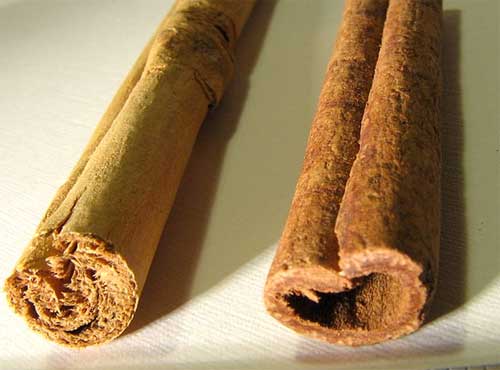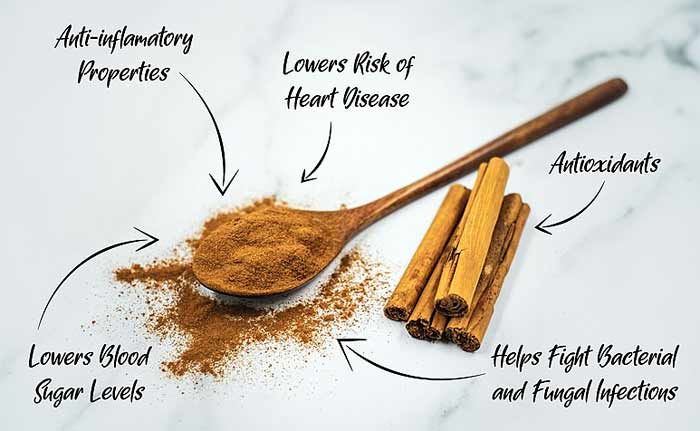Cinnamon in herbal medicine

Cinnamon is a medicinal spice.
Cinnamon is a pungent, sweet smelling, warming herb that stimulates the circulation. Cinnamon is used internally to help digestive problems, reduce flatulence, ease cramping, and provide relief from diarrhea.
Its warming action is used to treat colds, flu, body aches, arthritis, and rheumatism.

Use cinnamon to sooth symptoms of colds and flu.
Cinnamon, cloves, ginger, allspice, and nutmeg can help if a cold or flu strikes. They sooth the worst symptoms and shorten duration of illness.
Add warming spices to a cup of chamomile or mint tea. Inhale while sipping and allow the vapors to fill the sinuses.
Cinnamon tea fights colds, sore throats and more
This video shows how to build your immune system with ingredients like cinnamon, ginger, and honey.
Cinnamon essential oil and aromatherapy
Cinnamon essential oil is distilled from the bark of the cinnamon tree. It has a soft and sweet aroma.
Rich, spicy cinnamon essential oil provides an effective remedy for the flu, nausea, fatigue, and depression.
It makes a warming ointment for treating arthritis pain naturally.
Cinnamon oil is antiseptic and astringent.
It is also used to help digestion and respiratory problems.
Cinnamon essential oil has many uses in herbal medicine.
Cinnamon essential oil is used to help treat muscle spasms, vomiting, the common cold, loss of appetite, and erectile dysfunction.
Cinnamon essential oil is also used in perfumes, soaps, cosmetics, toothpaste, after shave lotions, skin tonics, and many other herbal products.

Powdered cinnamon is also useful as a herbal remedy.
Small amounts, a quarter of a teaspoon or less, of powdered cinnamon can help improve blood circulation and digestion.
It helps fight bacterial and fungal infections.
Cinnamon improves glucose levels in patients with type 2 diabetes and reduces triglyceride levels, LDL cholesterol levels, and total cholesterol levels in some people.
Studies show that cinnamon may also help prevent or delay the onset of Alzheimer's disease.
Cinnamon can be used to stop diarrhea and stomach gas.
All cinnamon is not the same.
Different varieties of cinnamon have different properties. Be sure to buy the best cinnamon you can afford, especially when using it for healing purposes.
Some cinnamons are sold without a country of origin or Latin name. These cinnamons are cheap and probably come from China.
Types of cinnamon
Ceylon cinnamon (Cinnamomum zeylanicum)
The tastiest cinnamon comes from Sri Lanka. It is slightly sweet, light-reddish brown, and has the lowest coumarin content. It is considered true cinnamon.
Indonesian cinnamon (Cinnamomum burmanni)
This type is spicy, dark-reddish brown, with a strong aroma and a high coumarin content. I am assuming this is what most of us use since it is inexpensive.
Vietnam cinnamon (Cinnamomum loureiroi)
Like Indonesian, this cinnamon is spicy and sweet. It is also dark-reddish brown, high in coumarin, and has a strong aroma.
China cinnamon (Cinnamomum aromaticum)
China cinnamon is also called cassia cinnamon. It is spicy but bitter. Chinese cinnamon is dark-reddish brown, high in coumarin, and has a very strong taste.
Taiwan Cinnamon (Cinnamomum osmophloum)
Taiwan cinnamon is just recently available on the world market. It has a low coumarin content.
Cinnamon contains coumarin.
Coumarin can cause cancer and is toxic to the liver. It is best to purchase the better and more expensive cinnamons if possible.
Ceylon has the least coumarin, but it is expensive. If you are eating cheap cinnamon, do not eat it everyday and do not eat large amounts.

Scientific studies
Trials have been done on cinnamon to explore the spice's beneficial effects on Parkinson's, diabetes, blood disorders, and the brain.
Since cinnamon is antioxidant, anti-inflammatory, anti-diabetic, anti-microbial, and anti-cancer, it shows great promise in treating diseases.
- Cinnamon can lower resistance to insulin which proves useful in the treatment of diabetes.
- It contains phytochemicals that improve the brain's function.
- Cinnamon kills harmful bacteria like E. Coli and Listeria when added to foods, reducing the incidences poisoning.
- It can also be used to treat candida and yeast infection naturally.
- Cinnamon is also known to alter biofilms, offering protection against staph and other flesh-eating diseases.
- Due to strong antioxidant and anti-inflammatory properties, cinnamon is useful in treating heart disease.
- Regular use lowers cholesterol level in mice, and studies are underway to determine if cinnamon has the same effects in humans.
- Research is also underway to measure the effects of cinnamon on melanoma (cancer) cells.
- In dogs, cinnamon is shown to reduce blood pressure, although tests are yet to be done on humans.
Cinnamon in the kitchen
Powdered cinnamon can be added to herbal tea, apple cider, or hot milk for a delicious beverage. Of course, it is also good on toast and other sweets.
Cinnamon has a long history.
Cinnamon has been used since ancient times. The Bible tells that the Queen of Sheba gave it to King Solomon as a gift.
In medieval times doctors used cinnamon to treat conditions such as coughing, arthritis, and sore throats.
If you have been reading my Every Green Herb blog for a while, then you know we grow and sell a variety of herbs, but we also buy a lot, too. Try our favorite herbal suppliers for quality and value.
*Do not take essential oils internally without consulting a professional aromatherapist. Dilute essential oils before using on skin. Cinnamon essential oil should not be used during pregnancy. Cinnamon contains coumarin, which has been linked to liver damage so do not use therapeutic doses it if you have liver problems. Do not consume warming spices if you have ulcers.
Always consult with your healthcare provider before using any herbal remedy especially if pregnant, nursing, or taking other medicines.
Sources:
https://www.ncbi.nlm.nih.gov/pmc/articles/PMC4466762/
https://www.graduate.umaryland.edu/gsa/gazette/November-2015/Health-Benefits-of-Cinnamon/
Blessings to you and yours!
Thanks so much for reading my blog. Jan.

*Note - the information on this website has not been evaluated by the Food and Drug Administration.
© 2005-2024 website design and content by Janice Boling